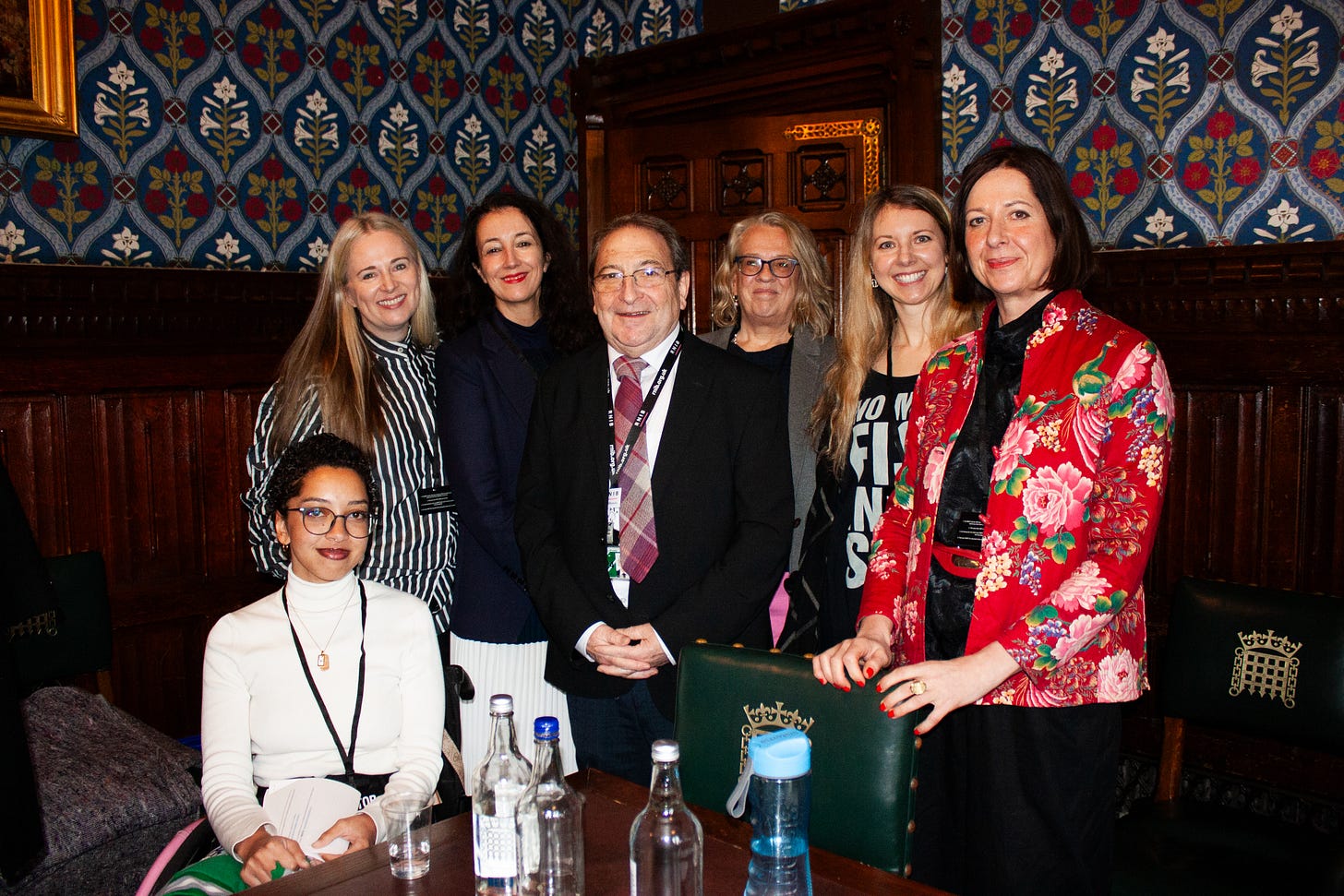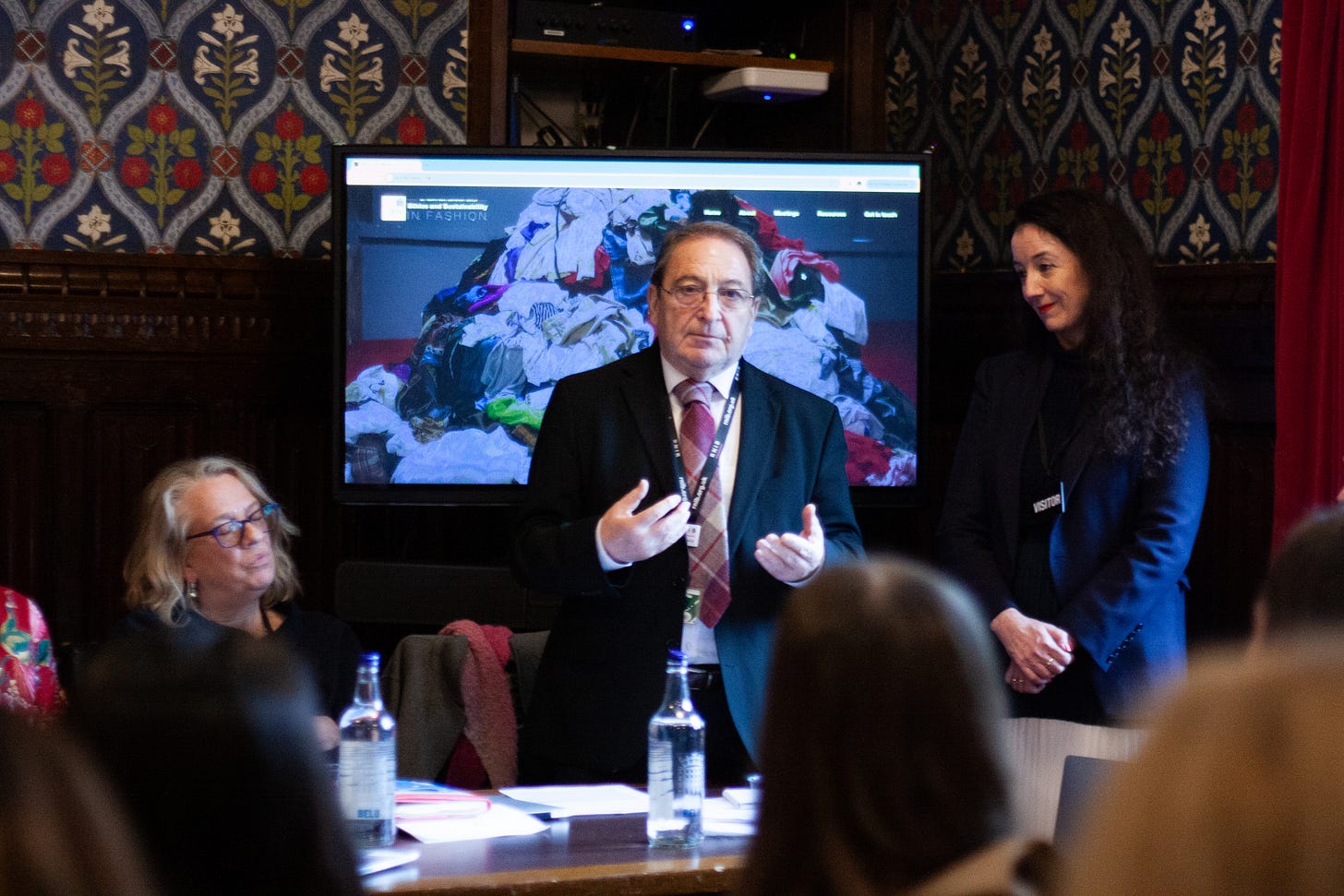Delivering a Sector Vision for the Fashion and Textile industry
Image: Panellists and Chair from left to right: Junior Bishop, Clare Press, Tamara Cincik, Chair John McNally MP, Dominique Muller, Julia Roebuck, Maria Chenoweth. Credit Steve Watson.
On the 22nd February 2024, Fashion Roundtable as Secretariat of the Ethics and Sustainability in Fashion All-Party Parliamentary Group delivered their sector vision for the fashion, textiles, manufacturing and retail industries to leading figures in the sector.
John McNally MP and Fashion Roundtable’s CEO, Tamara Cincik, chaired a poignant panel discussion about the future of the sector. Panellists included, Junior Bishop – a Zebedee Model and Advocate for Minority Groups; Clare Press – Fashion Roundtable’s Global Sustainability Expert, Author and Podcast Host of the Wardrobe Crisis; Julia Roebuck – Volunteer Director of Thread Republic (Mend Assembly Affiliate); Maria Chenoweth – Co-founder of Charity Super.Mkt; Dominique Muller from Labour Behind the Label.
Talking points encompassed representation and inclusion; the effects of Artificial Intelligence on the modelling sector; the Creative Wellbeing Economy; Clare Press’s research on reimagining the sector; social prescribing and third-sector initiatives; the purposeful use of vacant spaces with the example of Charity Super.Mkt and worker rights.
The meeting provided an opportunity for Fashion Roundtable to share recommendations based on evidence from a number of key sector roundtables, an industry wide snap survey and meetings with stakeholders. Fashion Roundtable identified the following top-line issues with clear recommendations for each:
Restriction-free movement for UK talent who wish to work in Europe and a reduction in red tape for the transportation of goods between the UK and EU.
The UK committing to Extended Producer Responsibility (EPR) to support the transition of the industry’s annual carbon footprint of 3.3 billion tonnes CO2e to Net Zero by 2050.
The reinstating of the VAT Retail Export Scheme with an estimated economy boost of £10bn a year according to current data.
Regenerating high streets to support UK businesses and protect local communities.
Greater support for on-shoring, a commitment to British made and a strengthening of public procurement.
Investment in UK manufacturing through consistent and secure orders.
Support for the UK as a place of decent work for garment workers.
Ratify the UNESCO Convention of Intangible Cultural Heritage.
Return to STEAM education.
Initiatives for UK workers from working-class backgrounds to access training and employment in the creative industries.
Support for more inclusivity in the fashion sector.
Rejoining of the Erasmus + Programme.
Artificial Intelligence (AI) and support of creative intellectual property (IP).
Food and fibre sovereignty.
Creative Wellbeing – Support for access to meaningful and rewarding work through a revaluing of craft, creativity, community, intersectionality and inclusivity.
Image: Chairs John McNally MP and Tamara Cincik. Credit Steve Watson.
Fashion Roundtable’s recommendations can be viewed here.
Fashion Roundtable also launched their Creative Wellbeing Economy paper, a living document which places people and planet in an interwoven symbiotic relationship: revaluing locality, creativity, and enhancing accessibility to transformative tools and opportunities as links in a newly formed chain of opportunity from cradle to grave.
Chair John McNally MP said:
“Once again the ESF APPG had a full attendance with a packed room of business representatives and academics alike. What was really interesting is the wider range of ages and diversity that attend, probably, the best attended APPG at Parliament.
“This APPG has provided so much information from the guest speakers and also the attendees who care deeply about this industry and how everyone engages with one another – it’s a pleasure to witness.
“The recommendations are there for everyone to read and understand how important the work that the Secretariat provides in pulling all this information together and to produce such a readable document.
“It is apparent that everyone who attends appreciates the effort, thought and expertise, and the knowledge in no small measure our professional Secretariat and guest speakers provide to all the attendees.”
Tamara Cincik, CEO, Fashion Roundtable said:
“I was delighted to deliver our sector vision in the build up to a General Election to the packed Parliamentary room filled with policy makers, industry leaders and academic experts. Our values and concerns are of paramount importance as politicians from across the political divide consider their manifesto pledges. We hope that our sector vision and key recommendations will help them to deliver those effectively and show understanding and commitment to our valuable sector and its stakeholders.”
Meg Pirie, Fashion Roundtable said:
"In writing these policy recommendations we have focused on long-term system’s change for the sector. The Creative Wellbeing Economy turns the 'growth-at-all-costs' paradigm on its head and reimagines something much deeper, that offers communities an opportunity to thrive outside of the current system. This focuses on long-term policies which put people and the planet first – valuing localism, food and fibre sovereignty, the preservation of cultural heritage and hyper-local placemaking. This is a living document and will forever evolve, but is the first step to a much-needed system's change within the fashion sector."
Our CEO Tamara Cincik speaks to CGTN Europe on 40 Years of London Fashion Week
Our CEO Tamara Cincik spoke to CGTN Europe on 40 Years of London Fashion Week. She discussed the ingenuity and talent of designers in the UK. From her memories of the early Alexander McQueen Chelsea shows to Meadham Kirchhoff who was one of many NEWGEN designers at the Design Museum’s recent ‘Rebel: 30 Years of London Fashion’ exhibition curated by Sarah Mower. Whether it’s on ethics, sustainability or identity, London has been the first to pose those questions.
New Research: Visually mapping EU policies for a Circular Fashion Textiles Industry

New research in collaboration between academics at Imperial College, University College London and Kings College London classifies key policies that govern the Fashion and Textiles Industry in the EU.
The tool provides clear identification of the policies and, accordingly, the policy gaps that exist in the EU policy landscape across the resource lifecycle. Accordingly, policymakers can focus their efforts to parts of the resource lifecycle where policies are limited. Their main findings suggest that:
The current focus of EU policy is on scaling circular activities, rather than displacing the linear economy. This risks policy rebound effects.
Current established policies disproportionately focus on the collection & recovery and Sourcing & Production phases of the resource lifecycle, with less attention to Pre-Consumption and Consumption phases.
There remains a focus on recycling policies rather than on reuse.
The established policy lacks a mutually reinforcing instrument mix. There is need for more coherent and complementary policies that target infrastructure, actors and resource elements.
Event: Black Fashion Canada Database
Image courtesy of Black Fashion Canada Database
Join this event to hear more about a case study that explores and shines a light on Black fashion history from Canada.
Founder of the Black Fashion Canada Database, Charmaine Gooden, will lead the presentation on the evolution of the BFC followed by a Q&A.
Founder, Kimberly Jenkins shares more about the theme for February, “Black (Fashion) History Month”:
“The contributions of those who identify as Black or part of the African diaspora has been critical to the development and allure of the fashion industry. Oftentimes overlooked in fashion history books, lessons, fashion exhibitions and films, Black designers, models, photographers, editors and stylists have added coolness and driven innovation throughout a racially-homogenous landscape.
“The multi-trillion-dollar fashion industry in fact owes a great debt to the enslaved ancestors who toiled the land to benefit those who mass-produced garments for profit. Despite navigating persistent mis-representation, discrimination and underestimation, The Fashion and Race Database is celebrating the creative triumphs and beauty that the Black community has brought to fashion history throughout the month of February.”
February 29th at 11 am EST
Santoni showcases local artisans at Milan Fashion Week
With the Fall-Winter 24-25 season, Santoni brought the natural beauty of the Marche region and the magical facets of traditional craftmanship to the forefront. Tradition weaved the plot, where the purest craftsmanship was elevated to its highest expression in feminine, flowing forms and illuminated by Arancio Santoni.
The presentation allowed for local artisans to showcase their craft to the audience as part of Santoni’s presentation in Milan.
Carbon Literacy Training for Fashion and Retail
A new Carbon Literacy course designed specifically for those working in fashion and retail and facilitated by Safia Minney MBE, allows students to gain the knowledge and tools to translate sustainability into action whatever their role or organisation.
The course runs online over two sessions (8 hours total) and is led by experienced sustainable fashion practitioners. It is engaging, interactive, designed to be highly participative with lots of useful tools and a lot of fun! It is a unique opportunity to not only enhance your understanding of sustainability in fashion but also to become an active participant in shaping a greener future for the industry.
As part of the course you will be required to make two pledges — an individual action pledge and a team-based action pledge to embed your learning and action to qualify for certification.










